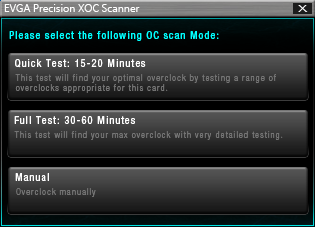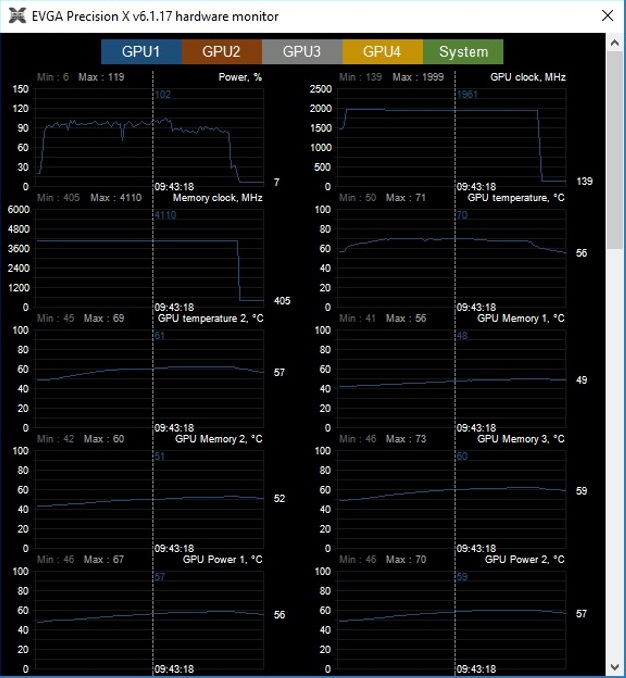We also spent a little time overclocking the EVGA GeForce GTX 1070 Ti FTW2 card, to see what kind of additional performance it might have available under its hood. There were some rumors that the GeForce GTX 1070 Ti couldn't be overclocked circulating a couple of weeks back, but those turned out to be incorrect. Though the FTW2 isn't overclocked out of the box, it can be overclocked using the same methods as other Pascal-based CPUs...
To overclock the
EVGA GeForce GTX 1070 Ti FTW2 we used a new XOC Scanner utility built right into EVGA's Precision app. The XOC Scanner takes all of the guess work out of GPU overclocking -- it automatically steps through higher and higher frequencies, while simultaneously placing a load on the card and scanning for visual anomalies. When it finds a stable overclock, it dials those settings right in. There is a "quick mode" available that takes about 15 minutes and tests a range of frequencies appropriate for the particular GPU installed, in addition to a "full test" that can take up to an hour, but actually tests frequencies at all of the various voltage points to create a custom voltage/frequency curve. Of course, you can still overclock manually as well.

We ran the quick test on our card to show a "worst case scenario" type overclock that should be repeatable on most cards, and once it was complete, we also cranked up the power and frequency targets to their maximum values for some additional breathing room. Ultimately, we saw a peak GPU clock of 1,999MHz with a 4,110MHz memory clock (effective speed 8.2Gbps).
While we had the EVGA GeForce GTX 1070 Ti FTW2 overclocked, we re-ran a couple of tests and saw some moderate improvements in performance in the games / settings we tested.
The performance improvements we observed while overclocking the card actually allowed the
EVGA GeForce GTX 1070 Ti FTW2 to overtake the GeForce GTX 1080 in both tests. And with even more tweaking (including voltage tuning), we suspect this card would have overclocked even higher.
|

|
|
Total System Power Consumption
|
|
Tested at the Outlet
|
|
Before bringing this article to a close, we'd like to cover a couple of final data points for power consumption and acoustics. Throughout all of our benchmarking and testing, we monitored noise output and tracked how much power our test system was consuming using a power meter. Our goal was to give you an idea of how much power each configuration used while idle and also while under a heavy gaming workload. Please keep in mind that we were testing total system power consumption at the outlet here, not the power being drawn by the graphics cards alone. It's a relative measurement that gives you a decent view of how much additional power draw a graphics card is placing on a system.

The GeForce GTX 1070 Ti's power consumption was right in-line with expectations. Under load, the Founder's Edition card consumed slightly less power than the GeForce GTX 1080, but more than a 1070 -- just what you'd expect. The custom EVGA card, with all of it's additional bells and whistles, consumed slightly more power, but it is not out of line. Both cards consumed much less power than the Vega 56, however.
We should also mention that GPU temperatures on the 1070 Ti are a non-issue. At idle, the cards' GPU hovered in the mid-30 degree range. And under sustained load the GPU temperature never actually hit the default target. Even while we had the EVGA card overclocked, the GPU peaked at only 71ºC, which is both impressive and reassuring.
Noise isn't a concern for the
GeForce GTX 1070 Ti either. At idle, the EVGA GeForce GTX 1070 Ti FTW2 is essentially silent, because the fans either spin down completely (depending on the temperature) or spin very slowly. Under load, with the default fan curve, the EVGA card is slightly louder than the Founder's Edition, but we'd still consider it quiet. And versus Vega there is no comparison -- the GeForces are much quieter under load, across the board.











